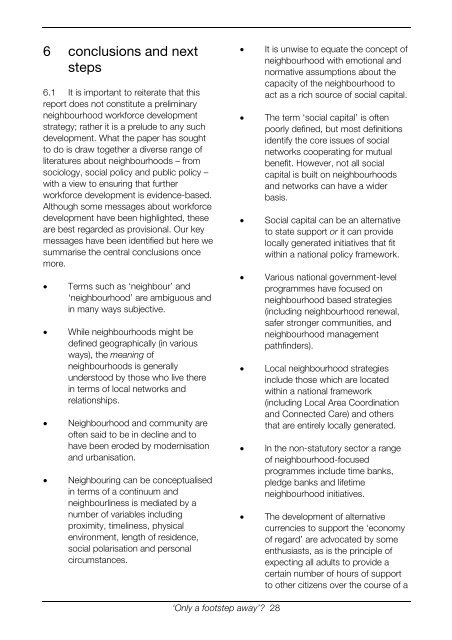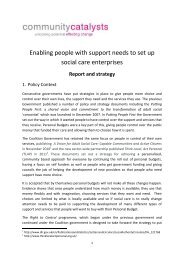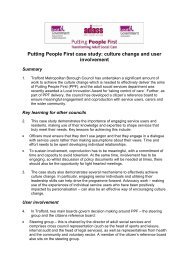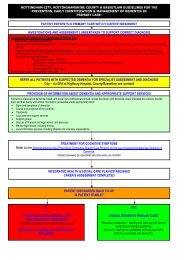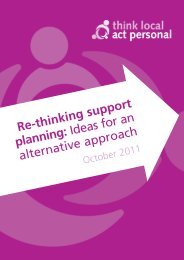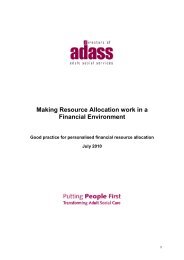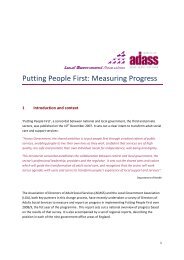'Only a footstep away' - Skills for Care - Think Local Act Personal
'Only a footstep away' - Skills for Care - Think Local Act Personal
'Only a footstep away' - Skills for Care - Think Local Act Personal
- No tags were found...
You also want an ePaper? Increase the reach of your titles
YUMPU automatically turns print PDFs into web optimized ePapers that Google loves.
6 conclusions and nextsteps6.1 It is important to reiterate that thisreport does not constitute a preliminaryneighbourhood work<strong>for</strong>ce developmentstrategy; rather it is a prelude to any suchdevelopment. What the paper has soughtto do is draw together a diverse range ofliteratures about neighbourhoods – fromsociology, social policy and public policy –with a view to ensuring that furtherwork<strong>for</strong>ce development is evidence-based.Although some messages about work<strong>for</strong>cedevelopment have been highlighted, theseare best regarded as provisional. Our keymessages have been identified but here wesummarise the central conclusions oncemore.• Terms such as ‘neighbour’ and‘neighbourhood’ are ambiguous andin many ways subjective.• While neighbourhoods might bedefined geographically (in variousways), the meaning ofneighbourhoods is generallyunderstood by those who live therein terms of local networks andrelationships.• Neighbourhood and community areoften said to be in decline and tohave been eroded by modernisationand urbanisation.• Neighbouring can be conceptualisedin terms of a continuum andneighbourliness is mediated by anumber of variables includingproximity, timeliness, physicalenvironment, length of residence,social polarisation and personalcircumstances.• It is unwise to equate the concept ofneighbourhood with emotional andnormative assumptions about thecapacity of the neighbourhood toact as a rich source of social capital.• The term ‘social capital’ is oftenpoorly defined, but most definitionsidentify the core issues of socialnetworks cooperating <strong>for</strong> mutualbenefit. However, not all socialcapital is built on neighbourhoodsand networks can have a widerbasis.• Social capital can be an alternativeto state support or it can providelocally generated initiatives that fitwithin a national policy framework.• Various national government-levelprogrammes have focused onneighbourhood based strategies(including neighbourhood renewal,safer stronger communities, andneighbourhood managementpathfinders).• <strong>Local</strong> neighbourhood strategiesinclude those which are locatedwithin a national framework(including <strong>Local</strong> Area Coordinationand Connected <strong>Care</strong>) and othersthat are entirely locally generated.• In the non-statutory sector a rangeof neighbourhood-focusedprogrammes include time banks,pledge banks and lifetimeneighbourhood initiatives.• The development of alternativecurrencies to support the ‘economyof regard’ are advocated by someenthusiasts, as is the principle ofexpecting all adults to provide acertain number of hours of supportto other citizens over the course of a‘Only a <strong>footstep</strong> away’? 28


